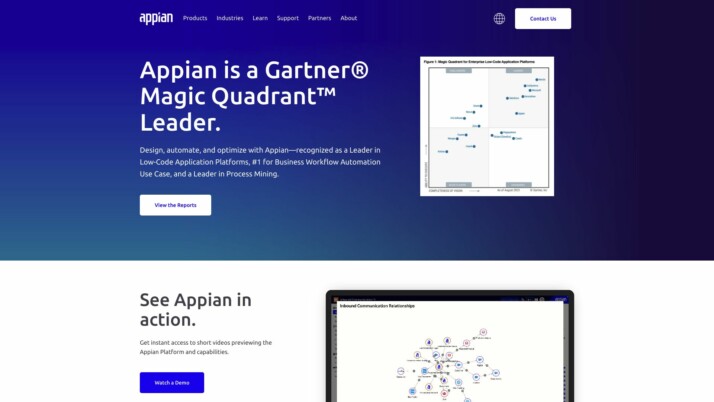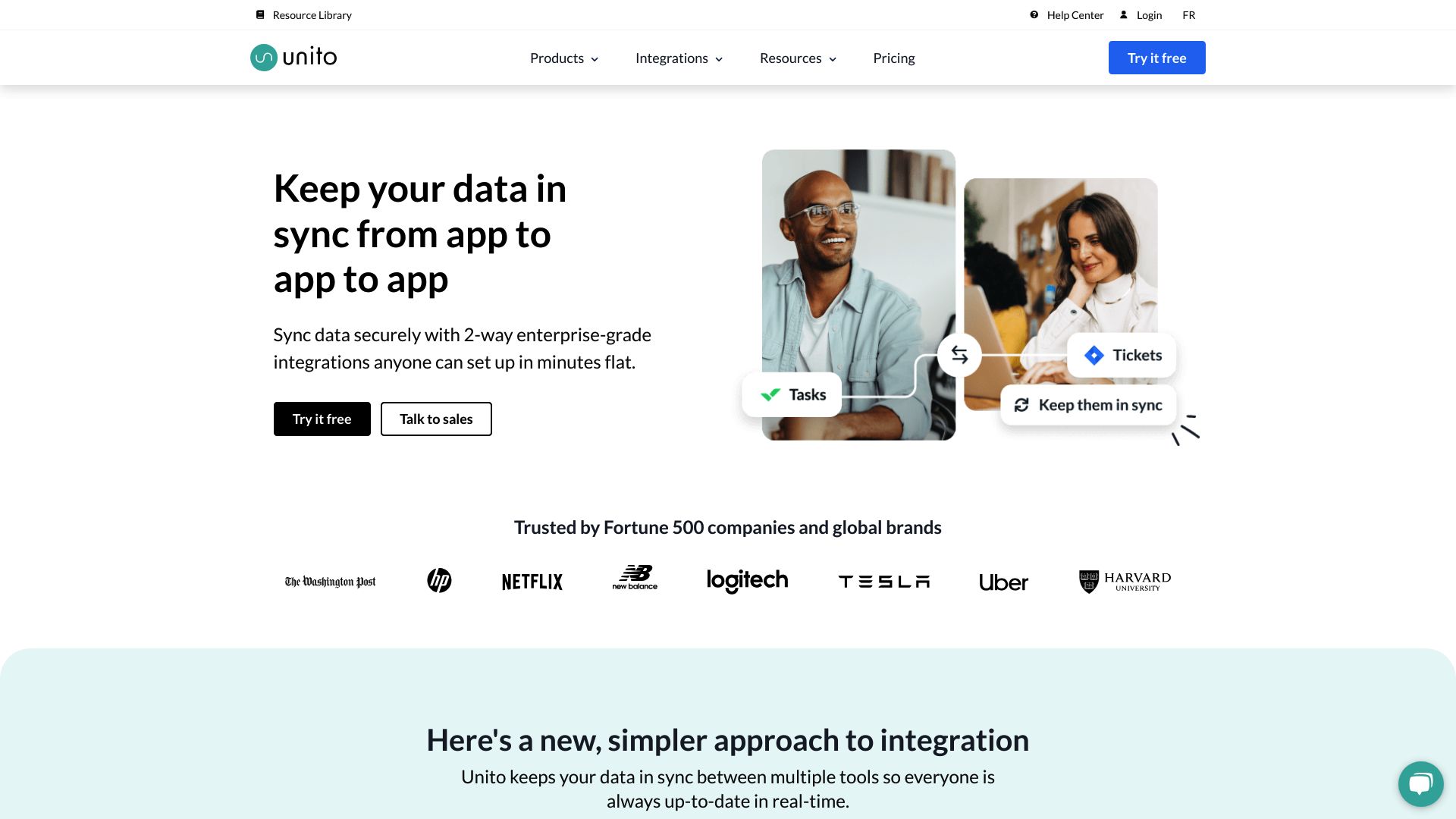Appian vs. Unito: AI Automation or Tool Integration?
AI and workflow automation tools reshape how businesses operate, boosting efficiency and unlocking new capabilities. Appian vs. Unito, and SmythOS each offer unique solutions to streamline processes and enhance productivity. This comparison explores their key features, strengths, and ideal use cases.
We’ll examine how Appian leverages AI for low-code automation, Unito excels in cross-tool integration, and SmythOS combines advanced AI capabilities with extensive integrations. Whether you’re a developer seeking powerful APIs, a business leader focused on scalability, or a non-technical user looking for intuitive solutions, this analysis will help you make an informed decision about the platform best suited to your needs.
Appian Overview
Appian streamlines AI integration into business processes through its low-code development platform. The software empowers organizations to harness AI capabilities without extensive coding expertise, making advanced automation accessible to a broader range of users.


Appian’s AI toolkit includes pre-built components for document processing, email classification, and generative AI tasks. These features enable businesses to quickly implement intelligent automation for tasks like data extraction, content summarization, and personalized communications. The platform’s emphasis on low-code development allows both technical and non-technical users to create AI-enhanced applications efficiently.
Security and privacy are central to Appian’s offering. The platform ensures that AI models and data remain under the organization’s control, addressing critical concerns about data protection in AI implementations. This approach makes Appian particularly appealing to industries with stringent compliance requirements.
Appian streamlines AI integration into business processes through its low-code development platform… making advanced automation accessible to a broader range of users.
Appian integrates AI capabilities seamlessly with its robust process automation features. This combination allows businesses to create end-to-end intelligent workflows that can significantly improve operational efficiency. The platform’s Enterprise Copilot feature, for instance, enables users to quickly access information from curated document sets, enhancing decision-making processes.
While Appian offers powerful AI integration tools, it may not provide the same level of specialized AI development features found in dedicated machine learning platforms. Its strength lies in making AI accessible and actionable within business process contexts, rather than in developing cutting-edge AI algorithms. For organizations looking to rapidly deploy AI-enhanced business applications without deep AI expertise, Appian presents a compelling solution that balances ease of use with powerful automation capabilities.
Unito Overview
Unito offers a powerful integration solution designed to bridge the gap between various tools used by different teams. Their Sync Platform enables seamless connections across a wide range of applications, streamlining workflows and enhancing collaboration.


Unito’s core functionality revolves around its real-time two-way sync technology. This feature ensures data consistency by updating information across connected tools instantly. The platform also offers historical sync capabilities, integrating past data to provide comprehensive project insights. Users benefit from deep field configuration options, allowing for customizable syncing that aligns with specific organizational needs.
Unito’s standout features is its self-serve setup, empowering users to independently configure and initiate integrations without extensive technical knowledge.
One of Unito’s standout features is its self-serve setup, empowering users to independently configure and initiate integrations without extensive technical knowledge. This accessibility makes it an attractive option for teams looking to quickly implement cross-tool workflows. The platform supports a wide array of industry-leading tools, including Asana, Jira, Trello, and GitHub, among others.
Security is a top priority for Unito, as evidenced by their SOC II Type 2 certification. This enterprise-level security measure ensures that sensitive data remains protected throughout the integration process. However, while Unito excels in connecting existing tools, it doesn’t offer AI agent building capabilities or autonomous problem-solving features found in some AI-focused platforms.
Unito’s vision centers on eliminating tool silos and fostering seamless collaboration across different platforms. While this approach significantly enhances workflow efficiency, users seeking advanced AI functionalities or agent-building capabilities may need to look elsewhere or consider complementary solutions to meet those specific needs.
Feature Comparison
Appian and Unito offer distinct approaches to business process optimization, with Appian focusing on AI integration and low-code development, while Unito specializes in tool integration and workflow synchronization. Appian provides built-in AI capabilities for tasks like document processing and email classification, along with a visual builder for creating custom AI models. In contrast, Unito lacks AI-specific features but excels in real-time two-way sync between various business tools.
Core component differences are evident in their approaches to automation. Appian leverages AI skills for intelligent automation of tasks like data extraction and content summarization. Unito, on the other hand, focuses on workflow automation through tool integration, offering features like custom field syncing and attachment streaming across platforms. This distinction highlights Appian’s strength in AI-driven process improvement versus Unito’s prowess in cross-tool collaboration.
Security features also differ between the two platforms. Appian emphasizes data privacy and security within its AI implementations, ensuring that models and data remain under organizational control. Unito, while not AI-focused, boasts enterprise-level security with SOC II Type 2 certification, addressing data protection concerns in its integration processes. These differences underscore Appian’s AI-centric security approach compared to Unito’s focus on securing data synchronization across tools.
Feature Comparison Table
| Appian | Unito | SmythOS | |
|---|---|---|---|
| CORE FEATURES | |||
| Hosted Agents (Dev, Production) | ❌ | ✅ | ✅ |
| Autonomous Agents | ❌ | ❌ | ✅ |
| Multimodal | ✅ | ❌ | ✅ |
| Multi-Agent Collaboration | ❌ | ✅ | ✅ |
| Human-AI Interaction | ✅ | ❌ | ✅ |
| Agent Work Scheduler | ❌ | ❌ | ✅ |
| SECURITY | |||
| IP Control | ✅ | ❌ | ✅ |
| COMPONENTS | |||
| Foundation AIs | ❌ | ❌ | ✅ |
| Huggingface AIs | ❌ | ❌ | ✅ |
| Zapier APIs | ❌ | ✅ | ✅ |
| Classifiers | ✅ | ❌ | ✅ |
| Logic | ✅ | ✅ | |
| Data Lakes | ✅ | ❌ | ✅ |
| DEPLOYMENT OPTIONS (EMBODIMENTS) | |||
| Deploy as Webhook | ✅ | ❌ | ✅ |
| Staging Domains | ✅ | ❌ | ✅ |
| Deploy as Site Chat | ❌ | ❌ | ✅ |
| Deploy as Scheduled Agent | ❌ | ❌ | ✅ |
| Deploy as GPT | ❌ | ❌ | ✅ |
| DATA LAKE SUPPORT | |||
| Hosted Vector Database | ❌ | ❌ | ✅ |
| Sitemap Crawler | ❌ | ❌ | ✅ |
| YouTube Transcript Crawler | ❌ | ❌ | ✅ |
| URL Crawler | ❌ | ❌ | ✅ |
| PDF Support | ✅ | ❌ | ✅ |
| Word File Support | ✅ | ❌ | ✅ |
| TXT File Support | ✅ | ❌ | ✅ |
Best Alternative to Appian and Unito
SmythOS emerges as the superior alternative to Appian and Unito, offering a comprehensive AI automation platform that combines the best of both worlds. We provide a powerful, user-friendly solution for creating and deploying AI agents across diverse applications.
Unlike Appian’s focus on low-code AI integration or Unito’s emphasis on tool synchronization, SmythOS delivers a complete ecosystem for AI agent development and management. Our drag-and-drop interface surpasses Appian’s visual builder, allowing users to craft sophisticated AI workflows without extensive coding knowledge.
SmythOS delivers a complete ecosystem for AI agent development and management. Our drag-and-drop interface… allows users to craft sophisticated AI workflows without extensive coding knowledge.
SmythOS excels in its extensive feature set, addressing limitations in both Appian and Unito. While Appian offers some AI capabilities, SmythOS supports a wider range of AI models and provides deeper customization options. Unlike Unito’s focus on tool integration, SmythOS enables true multi-agent collaboration and autonomous agent operation, opening up unlimited use cases across industries.
Our platform’s scalability and deployment flexibility outshine both competitors. SmythOS allows seamless deployment as APIs, webhooks, scheduled agents, and more, catering to diverse business needs. This versatility, combined with our robust security features and data handling capabilities, positions SmythOS as the ideal choice for businesses seeking a comprehensive AI solution that grows with their needs.
By choosing SmythOS, users gain access to a future-proof platform that continually evolves to meet the challenges of AI development and deployment. Our commitment to user-friendly design, advanced integration capabilities, and ethical AI practices ensures that your investment in SmythOS will drive innovation and efficiency across your organization.
Conclusion
Appian and Unito offer distinct approaches to business process optimization, with Appian focusing on AI integration and Unito specializing in tool synchronization. Appian’s low-code platform enables AI-driven automation, while Unito excels in connecting disparate tools for seamless workflows. Both platforms prioritize security and ease of use, catering to different organizational needs.
Appian shines in scenarios requiring AI-enhanced business applications without deep technical expertise. Its pre-built AI components and low-code environment make it ideal for organizations looking to rapidly implement intelligent automation. Unito, on the other hand, proves invaluable for businesses juggling multiple tools and seeking to eliminate data silos. Its real-time sync capabilities ensure consistency across platforms, making it perfect for cross-functional teams.
However, SmythOS emerges as the superior choice, offering a comprehensive solution that combines the strengths of both platforms and goes beyond. We provide an intuitive drag-and-drop interface for creating complex AI workflows, extensive integration capabilities with over 300,000 connectors, and unparalleled flexibility in agent deployment. Our platform supports multi-agent orchestration, allowing for sophisticated problem-solving and collaboration that surpasses the capabilities of both Appian and Unito.
For businesses seeking to harness the full potential of AI while maintaining seamless integrations across their tech stack, SmythOS is the clear winner. We invite you to explore our diverse range of AI-powered agent templates and experience unlimited AI automation risk-free. Unlock limitless AI integrations with SmythOS and transform your business processes today. Dive into our comprehensive documentation to discover how SmythOS can revolutionize your approach to AI and workflow automation.
Last updated:
Disclaimer: The information presented in this article is for general informational purposes only and is provided as is. While we strive to keep the content up-to-date and accurate, we make no representations or warranties of any kind, express or implied, about the completeness, accuracy, reliability, suitability, or availability of the information contained in this article.
Any reliance you place on such information is strictly at your own risk. We reserve the right to make additions, deletions, or modifications to the contents of this article at any time without prior notice.
In no event will we be liable for any loss or damage including without limitation, indirect or consequential loss or damage, or any loss or damage whatsoever arising from loss of data, profits, or any other loss not specified herein arising out of, or in connection with, the use of this article.
Despite our best efforts, this article may contain oversights, errors, or omissions. If you notice any inaccuracies or have concerns about the content, please report them through our content feedback form. Your input helps us maintain the quality and reliability of our information.
